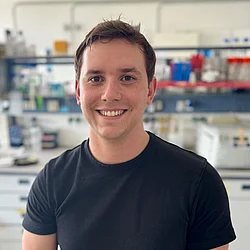Dr Max Kellner
Born and raised in Vienna, Max Kellner gained his first laboratory and publication experience during my undergraduate studies at the University of Vienna, working in Michael Nodine’s group at the Gregor Mendel Institute (GMI). There, he helped develop methods to study gene regulation by microRNAs and their role in plant embryogenesis. As a Master’s student, he joined Feng Zhang’s lab at the Broad Institute of MIT and Harvard (USA), where he worked on CRISPR/Cas13-based bacterial immunity proteins, focusing on their application in virus diagnostics (SHERLOCK) and targeted gene regulation in mammalian cells.
Kellner began his doctoral training at the University of Cambridge in Madeline Lancaster’s lab (MRC Laboratory of Molecular Biology), where he investigated evolutionary aspects of human brain development using stem cells and 3D organoids. During the first COVID-19 lockdown, he had to temporarily return to Vienna and joined the Institute of Molecular Pathology (IMP) as a guest researcher, where he played a leading experimental role in a team developing RT-LAMP-based rapid SARS-CoV-2 diagnostics. As part of a research collaboration with colleagues in Ghana, the project was further developed to enable more targeted and efficient detection of infections in rural regions of West Africa.
Following this work, Kellner permanently transferred to Vienna and completed his PhD at the Institute of Molecular Biotechnology (IMBA) in Josef Penninger’s lab. By developing novel organoid culture systems for bats, his dissertation project provided key insights into bat epithelial innate immune responses to highly pathogenic viruses such as Marburg virus and human coronaviruses like MERS-CoV and SARS-CoV-2.
Since April 1, 2025, Kellner has been leading the junior research group VICO (Virus-Host Coevolution) at the Helmholtz Centre for Infection Research (HZI). His research focuses on the molecular interactions between viruses and their hosts, with particular emphasis on evolutionarily shaped components of innate immunity that prevent infection and confer disease resilience in mammals.

